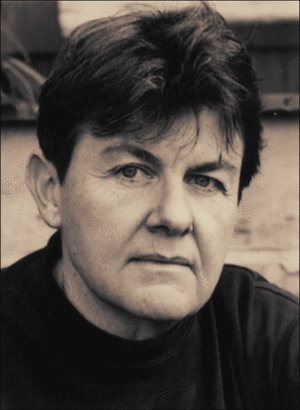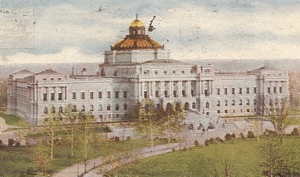 This week the Librarian of Congress, James Billington, announced the selection of Kay Ryan as the next poet laureate of the United States.
This week the Librarian of Congress, James Billington, announced the selection of Kay Ryan as the next poet laureate of the United States.
Some background about the position. First created in 1937 as the "Consultant in Poetry to the Library of Congress," the position did not officially take on the title of "United States Poet Laureate" until 1986 when, by an act of Congress, the position received the title it deserved. A few articles about Ryan have called her the "16th poet laureate" but this is for all practical purposes a ridiculous supposition as the position didn’t change, just the title. Secondly, the position is not chosen by the president. The president has nothing to do with the selection of this laureate. The title, you’ll recall is the Poet Laureate Consultant in Poetry to the Library of Congress of Congress. I feel the need to underline and bold this fact because this myth has been repeated by everyone from The West Wing tv show to a recent idiotic rant in the National Review.
In seven decades the position has been held by poets you’ve probably heard of (Robert Frost, Marianne Moore, Robert Penn Warren, James Dickey and Billy Collins) and poets, depending on your poetic reach, you’ve never heard of (Joseph Auslander, Josephine Jacobsen, Robert Hayden anyone?). I happen to co-curate a reading series here in DC that on two occasions has held readings featuring the work of past poet laureates. We call the readings "Lorettapalooza" as a nod to the popular Lollapalooza music festival and a "lightening up" of most people’s conception of poetry and the work of a "laureate." Dipping into the work of the best poets of over seventy years of American poetry has been a singular pleasure and in its two iterations has made for wonderful evenings of spoken poetry.
The range of poets has been pretty amazing and as I’ve gotten to know the work of the more obscure and forgotten poets it’s been a valuable addition to my own appreciation for the depth of American poetics. The diversity of laureates has also been rather remarkable. The position has been held by over 42 poets in 48 terms. This is because the position has changed names over time and some poets were called to serve under both titles. The fourth poet appointed, Louise Bogan, was a woman, cracking the gender barrier much sooner than in other positions. The position has not been very racially or ethnically diverse. Robert Hayden was the first African-American appointed in 1976. There have never been Asian American, American Indian or Latino poet appointed. I could make a few suggestions to this end if they’d be open to suggestions. They should work on that soon. There have been numerous foreign-born poets starting with Stephen Spender and most recently Charles Simic last year.
 The position has been celebrated as the "catbird seat" of American poetry while others have complained about the position’s vagueness. Elizabeth Bishop hated her time as consultant while Robert Lowell described the position as "neither a librarian nor a Washington official, but something odd, one of the Government’s oversights." Indeed the role of the poet laureate has always been a bit vague and has changed over the years. Originally the position was seen as a real consultantship and the poet actually moved to DC to spend a year (or two years if their appointment was repeated) working at the Library of Congress in a pretty palatial office overlooking the Capitol building. Consultants were expected to oversee the Library’s vast holdings in poetry, to hold readings and to answer any questions about poetry. A congressman wanting to find just the right line from Cicero for his diatribe from the senate floor could call up the office and get some suggestions. Archibald MacLeish, the only poet to hold the position of Librarian of Congress, redesigned the position as a one year position to recognize an excellent poet and provide them with a year free of most constraints in which they could do research on future work. James Dickey gave the position it’s very public face and initiated the practice of inviting multiple poets to read at the library (a common practice today). Sadly poet laureates don’t move to DC anymore. Most hold academic teaching positions and only come to Washington to give their own readings (which launches the season) and also regularly travels to the capitol to introduce their selected poets. In those public readings I have had the pleasure of hearing some wonderful poets — Galway Kinnell, and Charles Simic and Donald Hall (the last two poet laureates). In Washington, people wait to hear who has been selected as laureate and then wait to hear who the laureate will invite to come read. These free readings by these great poets are among the special delights of living in the nation’s capitol.
The position has been celebrated as the "catbird seat" of American poetry while others have complained about the position’s vagueness. Elizabeth Bishop hated her time as consultant while Robert Lowell described the position as "neither a librarian nor a Washington official, but something odd, one of the Government’s oversights." Indeed the role of the poet laureate has always been a bit vague and has changed over the years. Originally the position was seen as a real consultantship and the poet actually moved to DC to spend a year (or two years if their appointment was repeated) working at the Library of Congress in a pretty palatial office overlooking the Capitol building. Consultants were expected to oversee the Library’s vast holdings in poetry, to hold readings and to answer any questions about poetry. A congressman wanting to find just the right line from Cicero for his diatribe from the senate floor could call up the office and get some suggestions. Archibald MacLeish, the only poet to hold the position of Librarian of Congress, redesigned the position as a one year position to recognize an excellent poet and provide them with a year free of most constraints in which they could do research on future work. James Dickey gave the position it’s very public face and initiated the practice of inviting multiple poets to read at the library (a common practice today). Sadly poet laureates don’t move to DC anymore. Most hold academic teaching positions and only come to Washington to give their own readings (which launches the season) and also regularly travels to the capitol to introduce their selected poets. In those public readings I have had the pleasure of hearing some wonderful poets — Galway Kinnell, and Charles Simic and Donald Hall (the last two poet laureates). In Washington, people wait to hear who has been selected as laureate and then wait to hear who the laureate will invite to come read. These free readings by these great poets are among the special delights of living in the nation’s capitol.
Now enters Kay Ryan to the position. I first became acquainted with Ryan’s work through my friend Michael Gushue who sang her praises long ago. I had a chance to hear her last year at the Folger Library and consider it one of the best public readings by a poet I’ve ever attended. The poetry itself was quite remarkable and good. But I was most struck by her attention and care to her audience and to the real appreciation and understanding of the dynamics of public reading. I recall her stopping after reading one of her poems and saying, "I think I’ll read that again. Would that be alright?" This theater filled with hundreds nodded or murmured its enthusiastic assent and Ryan read the poem again. It was a small thing but it struck me that I had never experienced this before. You know, there are times when one needs to hear a poem read aloud twice to get it. To hear the mechanics and the chimes within the lines. Her poems are short wonders and you want to hear them again to really appreciate their beauty. Her work has been compared to Emily Dickinson’s work. I can see that. There’s a sparing use of language in Ryan’s work that is Dickinsonian. But there’s an internal use of hidden rhyme that I’m struck by in Ryan’s work. It’s the sort of poetry that you read and enjoy and then want to read aloud. You want to hear the words come out of your mouth, hang in air and then have the rhymes strike each other. As someone who writes in a free verse form and, truth be told, gets a bit tired from all the yacking of formalist bullies, I take a great delight in Ryan’s work. It’s innovative and not hackneyed (in ways that most formalist poetry pushers work suffers to my ears).
The Washington Post and New York Times‘ stories about Ryan’s selection both talk about Ryan’s long path to notice and success. She seems rather down to earth about the whole thing. She has written in the past with pretty curt dismissal about the professional poetry and writing workshop world. She bears her own bootstraps autodidactic role as a badge of pride and that’s to be applauded in a time of uber-professionalism. But this would all be beside the point if the craft wasn’t so good. I’m very curious to see who Ryan invites to come read. I look forward to those readings. They offer an insight into the laureate’s tastes. I also look forward to hearing this poet read her own work in the Library’s Madison building. It’d be wonderful if Ryan considered spending more time in the capitol. I think she would find a city with a vibrant poetic community willing to engage and support innovative work. I assume it’s largely up to her. But she seems to be enough of a firebrand to make it happen if she’d like it. I should also add that I’m proud to have another GLBT poet be appointed to the position.*** While the New York Times mentioned Ryan’s partner Carol Adair in the article, the Washington Post is to be applauded for writing of Adair’s huge influence in Ryan’s rise in poetry and also for mentioning their recent marriage after being together 30 plus years after the recent California marriage ruling.
Kay Ryan’s poetry:
The Niagara River – 2006
Say Uncle: Poems – 2000
Elephant Rocks: Poems – 1997
***Elizabeth Bishop held the position in 1949 (although her same sex relationships were not known at the time and would be verified after her death), Stephen Spender held the position (although his biography and his back and forth is such a mess he’s probably not worth counting). William Meredith held the position in the late 1970s (his longtime partner, the poet Richard Harteis, has written movingly about their relationship).